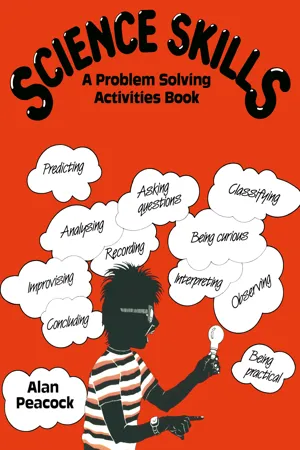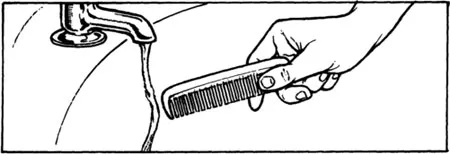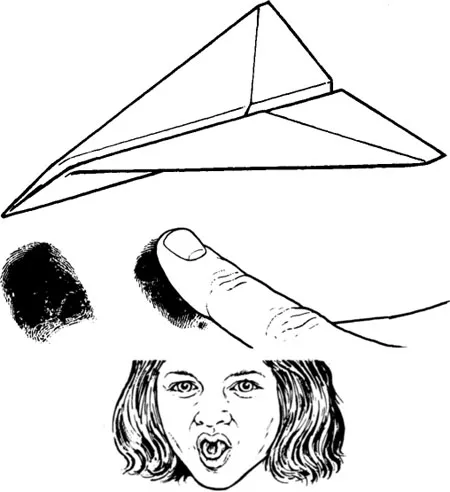
- 72 pages
- English
- ePUB (mobile friendly)
- Available on iOS & Android
eBook - ePub
About this book
This is a practical book for pupils, designed to teach the basic skills of scientific investigation and problem solving. With an emphasis on skills not facts, it is practical in approach, describing over 100 activities. No specialised apparatus is required and the investigations it covers are flexible enought to relate to any science course.
Tools to learn more effectively

Saving Books

Keyword Search

Annotating Text

Listen to it instead
Information
PART ONE:
SKILLS
UNIT 1
Asking questions
People have always wanted to fly. Before the first aeroplane, people tried many ways of getting up into the air. They were all trying to answer the question: ‘How can men fly?’
The Wright brothers answered the question when they built the first aeroplane. They could not build it from a book because it had never been done before. They had to try things out and make discoveries.
When the Wright brothers were trying things out to answer their question, they were doing science. You are doing science when you are trying things out and making discoveries to answer a question. Your question will not be as big as the Wright brothers’ but that does not matter.
Here is something for you to do.
A: Activity
Take a nylon comb and comb your hair about ten times. Turn a tap so the water runs out slowly. Hold the comb close to the stream of water.

What happens? Did you ask any of these questions
when you saw what happened?
Can I make the water bend the other way?
How far does it bend?
Does it always bend by the same amount?
Do all combs have the same effect?
Does it depend on the kind of hair?
What happens if the comb touches the water?
Answer the questions by trying things out. Try and make the water bend other way. See how far you can make the water bend , and so on.
When you are trying things out in science you are doing experiments.
Sometimes you can answer a question just by observing or measuring. Sometimes a question will be very difficult and you will need more knowledge before you can answer it.
B: Activity
Make a paper dart like the one in the picture and fly it.
Does the dart flywell? You may have asked the questions: ‘How I can make it fly better?’ This questions may have led to other questions: Will it fly better if I fold the paper more carefully?
Should the wings tilt forward or backwards?
Should the wings upwards or downwards?
Are some kind of paper better than others?
Does the size matter?

Answer the questions by doing some experiments. The question tellyou what you need todo. Look at the first questions above. To find the answer, make another dartby folding the paper very carefully. Fly it. Does itfly better than the first dart? You may have to fly the first dart again.
The starting point of most science is a question.
You were given some questions in the two activities on this page. Now you must learn to ask questions for yourself.
Try Yourself
C
Make a set of thumb and finger prints. To do this, put some ink on blotting paper. Press your finger on the ink and then on to clean paper.
Compare your prints with your friends’ and classmates’.
Are any of the prints the same as yours?
What other questions come into your mind as you look at the prints?
D
Some people can roll their tongues and some cannot.
Can you roll your tongue? Ask your classmates to try.
What questions can you ask to find out more about this? Here are two to start you off:
How many people in your class can do this?
Can you do it if you practise?
E
Fold your hands quickly without thinking about it. Which thumb is on top of the other? Is it the right-hand thumb or the left-hand?
How many right-hand thumbers are there in the class?
What other questions come into your mind?
F
Find a partner and count the number of times ...
Table of contents
- Cover Page
- Title Page
- Copyright Page
- Dedication
- Acknowledgements
- Contents
- Introduction
- Part One: Skills
- Part Two: Topics
- Part Three: Tests
- Part Four: Teacher’s Section
- Answers to questions in Units
Frequently asked questions
Yes, you can cancel anytime from the Subscription tab in your account settings on the Perlego website. Your subscription will stay active until the end of your current billing period. Learn how to cancel your subscription
No, books cannot be downloaded as external files, such as PDFs, for use outside of Perlego. However, you can download books within the Perlego app for offline reading on mobile or tablet. Learn how to download books offline
Perlego offers two plans: Essential and Complete
- Essential is ideal for learners and professionals who enjoy exploring a wide range of subjects. Access the Essential Library with 800,000+ trusted titles and best-sellers across business, personal growth, and the humanities. Includes unlimited reading time and Standard Read Aloud voice.
- Complete: Perfect for advanced learners and researchers needing full, unrestricted access. Unlock 1.4M+ books across hundreds of subjects, including academic and specialized titles. The Complete Plan also includes advanced features like Premium Read Aloud and Research Assistant.
We are an online textbook subscription service, where you can get access to an entire online library for less than the price of a single book per month. With over 1 million books across 990+ topics, we’ve got you covered! Learn about our mission
Look out for the read-aloud symbol on your next book to see if you can listen to it. The read-aloud tool reads text aloud for you, highlighting the text as it is being read. You can pause it, speed it up and slow it down. Learn more about Read Aloud
Yes! You can use the Perlego app on both iOS and Android devices to read anytime, anywhere — even offline. Perfect for commutes or when you’re on the go.
Please note we cannot support devices running on iOS 13 and Android 7 or earlier. Learn more about using the app
Please note we cannot support devices running on iOS 13 and Android 7 or earlier. Learn more about using the app
Yes, you can access Science Skills by Alan Peacock in PDF and/or ePUB format, as well as other popular books in Education & Education General. We have over one million books available in our catalogue for you to explore.